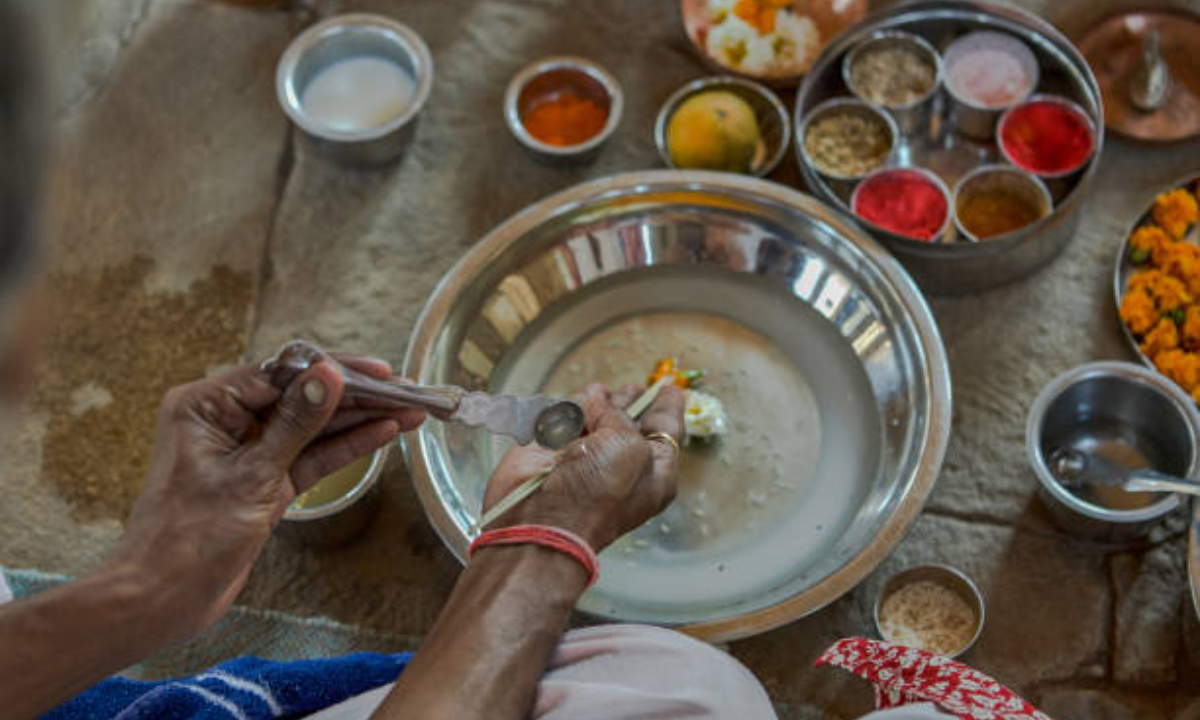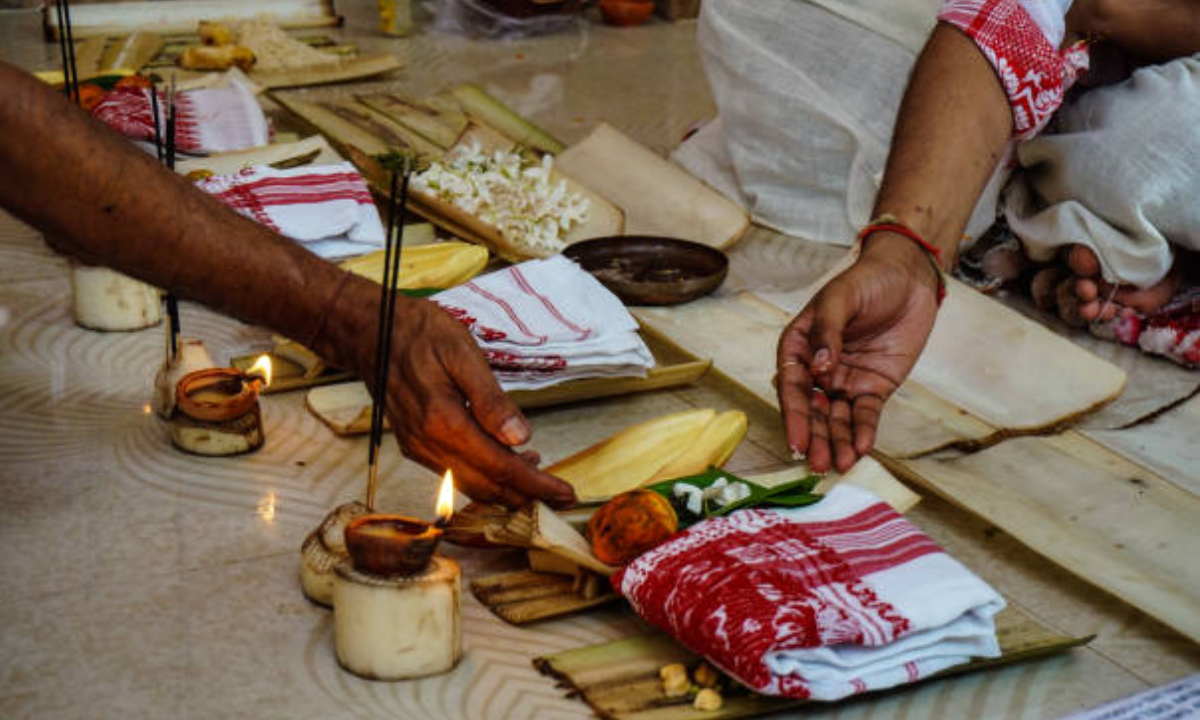Death, in Hindu philosophy, is not viewed as an end but as a transition—a journey of the soul from one realm to another. This profound understanding shapes the elaborate death rituals and ceremonies that follow the passing of a loved one, each designed to facilitate the soul’s peaceful journey and provide solace to the grieving family. Among these sacred observances, the 13th day ritual, known as “Terahvin” or “Preta Karma,” holds exceptional significance in Hindu tradition.
The 13th day marks a pivotal moment in the post-death ceremonial period, representing the spiritual activities and the beginning of a new phase for both the departed soul and the bereaved family. Understanding this ritual’s deep significance helps families appreciate not just its ceremonial importance but its profound spiritual and psychological benefits during one of life’s most challenging transitions.
The Spiritual Meaning of the 13th Day
Hindu scriptures describe the period immediately following death as a critical transition phase for the soul. According to ancient texts like the Garuda Purana and Vishnu Purana, the soul remains in an intermediate state called “Preta” for the first 13 days after death. During this period, the soul is believed to have neither fully departed from the earthly realm nor completely settled in its next destination.
The 13th day ritual serves as the spiritual bridge that helps the soul complete this transition. Through specific ceremonies, guided by a priest, chanting mantras, and offerings, the family assists the departed soul in shedding its earthly attachments and moving forward on its spiritual journey. This transformation from “Preta” (unsettled spirit) to “Pitru” (ancestral spirit) is considered essential for the soul’s peaceful progression and the family’s spiritual well-being.
The ritual acknowledges that death affects not just the physical body but also creates spiritual disturbances that require careful attention and ceremonial healing. The 13-day period allows for this spiritual adjustment, with the 13th day marking the completion of this crucial transition phase.
Traditional Practices and Ceremonies

The 13th day ritual encompasses several interconnected ceremonies, each carrying specific spiritual significance. The day typically begins with elaborate prayers and the performance of “Shraddha,” a ceremony dedicated to honoring the deceased and ensuring their spiritual welfare. This involves the recitation of sacred mantras, the offering of specific foods, and the performance of rituals designed to provide spiritual nourishment to the departed soul.
Central to the ceremony is the preparation and offering of “Pinda Daan“—rice balls mixed with sesame seeds, milk, and honey. These offerings are believed to provide sustenance to the soul during its transition and help establish its new spiritual status. The number, preparation method, and offering procedure for these rice balls follow ancient prescribed guidelines that vary according to regional traditions and family customs.
The ceremony also includes the feeding of Brahmins or learned individuals, as this act is considered highly meritorious and beneficial for the departed soul. The food offered typically includes the deceased person’s favorite dishes, creating a symbolic connection between the earthly preferences of the departed and their ongoing spiritual journey.
Charitable donations, known as “Daan,” form another crucial component of the 13th day observances. Families traditionally donate clothes, food, money, or other useful items to the needy, believing that these acts of charity generate positive karma that benefits the departed soul. The type and extent of charitable giving often reflect the family’s capacity and the perceived needs of the departed soul’s spiritual journey.
Regional Variations and Cultural Adaptations
While the core spiritual significance of the 13th day remains consistent across Hindu traditions, the specific practices and ceremonies vary considerably across different regions and communities. In North India, the ritual often includes elaborate feasts and community gatherings, emphasizing the social support system that surrounds the grieving family.
South Indian traditions may focus more intensively on the ritualistic aspects, with detailed ceremonies performed by specialized priests who guide the family through complex liturgical procedures. The offerings, prayers, and ceremonial elements are adapted to local customs while maintaining the essential spiritual objectives of the observance.
These regional differences highlight Hinduism’s remarkable adaptability and the way ancient spiritual principles can be expressed through diverse cultural forms. Despite these variations, the underlying intent remains the same: to facilitate the soul’s peaceful transition and provide structured support for the grieving family.
Psychological and Social Benefits
Beyond its spiritual dimensions, the 13th day ritual serves crucial psychological and social functions for the bereaved family. The structured nature of the 13-day observance period provides a framework for grief processing, allowing family members to channel their emotions through meaningful activities rather than being overwhelmed by their loss.
The ritualistic activities also provide a sense of purpose and agency during a time when families often feel helpless in the face of loss. By actively participating in ceremonies believed to benefit their loved one’s spiritual journey, family members find meaningful ways to express their love and care even after death has separated them physically.
The preparation and sharing of food during these ceremonies serve both practical and symbolic purposes. It ensures that the grieving family receives proper nutrition during a time when they might neglect their well-being, while also creating opportunities for social bonding and community support.
Modern Adaptations and Relevance
In today’s rapidly changing world, many families seek to balance traditional observances with contemporary practical constraints. Modern adaptations of the 13th day ritual often involve modified schedules that accommodate work commitments, smaller gatherings that reflect urban living situations, and simplified ceremonies that maintain spiritual significance while reducing logistical complexity.
Some families choose to combine traditional elements with contemporary expressions of remembrance, such as creating memorials that reflect the deceased person’s interests and values. These adaptations demonstrate how ancient wisdom can be expressed through modern forms while preserving the ritual’s essential spiritual and psychological benefits.
The involvement of professional funeral service providers has also evolved to support families in organizing these traditional ceremonies. Modern funeral services understand the importance of these rituals and can coordinate with religious authorities, arrange necessary materials, and manage logistical aspects while allowing families to focus on the spiritual and emotional dimensions of the observance.
The Continuing Journey: Beyond the 13th Day
The 13th day ritual establishes the foundation for this ongoing relationship, transforming the acute grief of immediate loss into a sustained spiritual connection that can provide comfort and meaning for years to come. Understanding this broader context helps families appreciate the 13th day not as an ending, but as a beginning of a new form of relationship with their loved one.
Conclusion
The 13th day ritual in Hinduism represents far more than a ceremonial observance—it embodies profound spiritual wisdom about death, transition, and the continuing bonds between the living and the departed. Through its carefully structured ceremonies, community involvement, and spiritual practices, this ancient tradition provides both practical support for grieving families and a meaningful framework for understanding death as part of life’s larger spiritual journey.
At Kaashimukthi, we understand the deep significance of these traditional observances and their importance in the healing process. A dedicated team works with families to ensure that all religious and cultural requirements are appropriately honored, allowing families to focus on the spiritual and emotional aspects of their loved one’s journey while we handle the practical arrangements with dignity and respect.

Madhu is an Entrepreneur, a Mentor, a Writer and an Aspiring Car Race Driver. He is Deeply passionate about leveraging Technology and Human Centred Design to make complex care and End of Life Planning easier. With the ultimate aim of Improving the quality of Life in the Twilight years. Madhu is highly educated and Alumni of IIM-Bangalore, Sikkim Manipal University and Bangalore University besides a Rich Industry Experience in the field of Product Management, Design, Supply chain, Finance, Commercial Management and Funeral Services.

